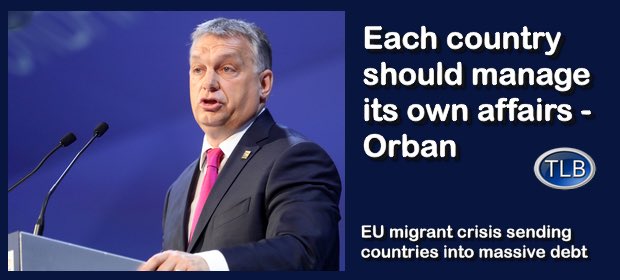
Orban: ‘The Hungarian model works’
Hungarian president Viktor Orban told an EU meeting in Sweden that the Hungarian model works and that he has no intention of changing it.
He pointed to Hungarian policies of full employment and low immigration, both key factors to the country’s success, while dismissing the EU’s insistence that Hungary should take in thousands more migrants.
Orban told an EU summit in Gothenburg this week that each country should manage their own affairs and “we Hungarians do not intend to replace our own model either”.
Viktor Orban is polling at 61 percent, with his Fidesz party the favorite in next year’s vote, while Germany’s open-border enthusiast Angela Merkel, has slipped in the polls to 29 percent.
“The most important danger is the debate between globalists and nations,” Orban had told a conference of Hungarian diaspora in Budapest earlier. “Europe has decided that it can step into a post-Christian and post-nation world.”
Immigration policy will be a key factor shaping the vote, said Orban. Hungary, together with Poland, Slovakia and the Czech Republic, remain largely homogeneous, and have all rejected mandatory EU quotas for housing immigrants. Orban noted that common ground with the next Austrian government in EU debates will also be “easy”.
Hungary does not believe immigration will solve its demographic problems of an aging population and a looming labor shortage, Orban had told Bloomberg news earlier. Instead, family-friendly policies to increase the population, make more sense, he said.
It has meanwhile been estimated that migrants could set the German economy back by more than a trillion euros.
Financial economist Bernd Raffelhüschen warned that Germany’s overall debt currently stands at €6.2 trillion. The long term costs of the original migrant crisis totals some €878 billion, but a “second generation” of migants struggling to integrate could push the cost up further.
Raffelhüschen said migrants pay less into the social security system than native Germans during their lifetime, and foreigners have contributed towards a negative fiscal balance.
Even though Germans received higher pensions – since on average they had contributed more during their lifetime – the state still profits more from Germans than from foreigners.
Last year, 2.1 million immigrants entered the country, more than half of them refugees. The economist said only a controlled immigration system to limit the flow of migrants could help to solve Germany’s economic problems.
“Germany can’t afford uncontrolled immigration permanently,” according to Raffelhüschen. “Politicians now have to ensure the best possible integration to at least curb the costs partly.”
The foundation Marktwirschaft also believes Germany is not profiting from the tidal wave of migrants.
CONTINUE READING HERE
ER recommends other articles by FreeWest Media




